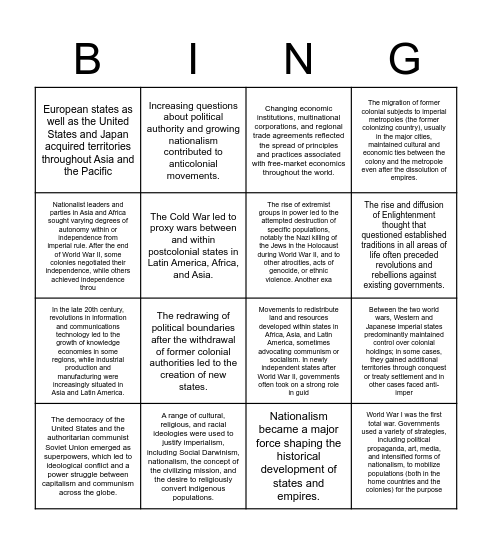

This bingo card has 16 words: A range of cultural, religious, and racial ideologies were used to justify imperialism, including Social Darwinism, nationalism, the concept of the civilizing mission, and the desire to religiously convert indigenous populations., Between the two world wars, Western and Japanese imperial states predominantly maintained control over colonial holdings; in some cases, they gained additional territories through conquest or treaty settlement and in other cases faced anti-imper, Changing economic institutions, multinational corporations, and regional trade agreements reflected the spread of principles and practices associated with free-market economics throughout the world., European states as well as the United States and Japan acquired territories throughout Asia and the Pacific, In the late 20th century, revolutions in information and communications technology led to the growth of knowledge economies in some regions, while industrial production and manufacturing were increasingly situated in Asia and Latin America., Increasing questions about political authority and growing nationalism contributed to anticolonial movements., Movements to redistribute land and resources developed within states in Africa, Asia, and Latin America, sometimes advocating communism or socialism. In newly independent states after World War II, governments often took on a strong role in guid, Nationalism became a major force shaping the historical development of states and empires., Nationalist leaders and parties in Asia and Africa sought varying degrees of autonomy within or independence from imperial rule. After the end of World War II, some colonies negotiated their independence, while others achieved independence throu, The Cold War led to proxy wars between and within postcolonial states in Latin America, Africa, and Asia., The democracy of the United States and the authoritarian communist Soviet Union emerged as superpowers, which led to ideological conflict and a power struggle between capitalism and communism across the globe., The migration of former colonial subjects to imperial metropoles (the former colonizing country), usually in the major cities, maintained cultural and economic ties between the colony and the metropole even after the dissolution of empires., The redrawing of political boundaries after the withdrawal of former colonial authorities led to the creation of new states., The rise and diffusion of Enlightenment thought that questioned established traditions in all areas of life often preceded revolutions and rebellions against existing governments., The rise of extremist groups in power led to the attempted destruction of specific populations, notably the Nazi killing of the Jews in the Holocaust during World War II, and to other atrocities, acts of genocide, or ethnic violence. Another exa and World War I was the first total war. Governments used a variety of strategies, including political propaganda, art, media, and intensified forms of nationalism, to mobilize populations (both in the home countries and the colonies) for the purpose.
Americans and their History Bingo | Final Review Bingo #3 | Impact of the French and Indian War on the British Empire | Unit 6 Imperialism BINGO | Semester Review
Share this URL with your players:
For more control of your online game, create a clone of this card first.
Learn how to conduct a bingo game.
With players vying for a you'll have to call about __ items before someone wins. There's a __% chance that a lucky player would win after calling __ items.
Tip: If you want your game to last longer (on average), add more unique words/images to it.